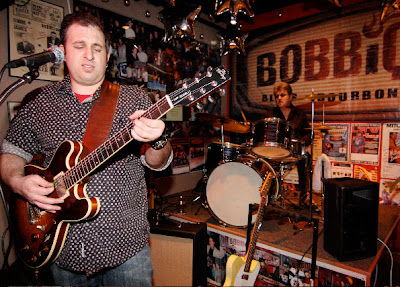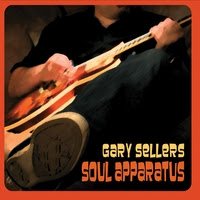by Nick DeRiso
Blues guitarist Gary Sellers has a depth of passion, and a delicate touch at melding styles, that belies his youth. Whatever grade he’s in, though, Sellers has done his homework.
Listening to his new recording Soul Apparatus, you hear Gregg Allman in Sellers’ vocal delivery, and a playing style that melds both the blues stylings of T-Bone Walker and the jazzy plucking of Wes Montgomery. There’s also no small amount of Sam Taylor, the late Long Island blues legend who eventually produced Seller’s solo debut, Young Man with the Blues. Taylor also wrote two songs and provides backing vocals here, completing the circle.
Things get off to a fast start, as Sellers becomes so smitten in the opening “Chewin’” that he even likes the way a love interest works over an ice cube. There’s a crisp groove for Sellers to sing and then solo over. The backing group, all respected members of the Long Island scene, includes keyboardist Danny Kean, bassist Dan Travis and drummer Mario Staiano.
But Sellers doesn’t stay down in the blues for long. An update of Stevie Wonder’s “Living for the City” follows, with Sellers turning the 1970s-era electric keyboard-driven soul song in a spacious slow burn. A rollicking group of backing vocalists swish and sway behind him, giving the tune a sleek sensuality. Seller’s solo, lithe and swinging, then propels the song into a gallop. Wonder’s lyric on the difficulties of breaking out of poverty’s cycle, given a full reading here, still ring true.
Next, in a bid to stave off the taxman, Sellers runs down a list of pawned items on the gritty “Done Sold Everything,” which stomps along at a pace that approaches Bo Diddley’s rhythms. “Sideshow” opens with a nasty funk-inspired wah-wah groove, as Sellers complains about the every-day annoyances that seem to consume us. “It’s a circus out here, mama,” Sellers finally surmises, “and your baby’s got the sideshow blues.”
Sellers settles into this scalding down-home gait for “Don’t Hurt No More,” a song where a scorned lover begins by proudly announcing his new relationship. That bravado quickly dissolves into familiar pain, though. “If I had known, honey, right from the start that you’d leave me with this broken heart,” Sellers slowly sighs, even as he wails away on guitar, “then I wouldn’t have given my whole, whole life to you.”
A stop-start R&B signature powers “Slow and Steady,” which is peppered with old-fashioned braggadocio about sexual prowess. Next, Sellers tangles majestically with Kean’s talkative organ work. “Beer Drinking Woman” begins with an ominous intro, straight of TV’s “Dragnet,” followed by a voiceover to match. “The story is true, ladies and gentlemen,” Sellers intones, “only the names have been changed to protect the innocent.” Sellers and Co., smirks all over their faces, then move into an insistent roadhouse-shaking rhythm. He goes on to retell the story of a night spent at a local tavern with a woman who drank up all of his spending money.
Then Sellers, up late with a tossing-and-turning partner, spends “Let’s Straighten It Out” trying to figure out how things have gone so wrong. He sings with all the winking bravado of the great chitlin’-circuit soul singers, using the title of the song both as bargaining chip and innuendo.
“That Did It, Baby,” presented in the surging style of a country blues, finds Seller’s character at the very end of his rope. After listing a series of previous grievances, none of which ever shook his resolve (“I didn’t quit you baby; I hung on like a vine”), there comes the final straw: “I saw your other man wearing my brand-new shoes.”
To close, Sellers channels the sweet soul of Sam Cooke – a final, most successful amalgamation of the blues and R&B idioms – on the lightly swinging “Dark End of the Street,” a song about forbidden love.
- Nick DeRiso’s Best of 2015 (Rock + Pop): Death Cab for Cutie, Joe Jackson, Toto + Others - January 18, 2016
- Nick DeRiso’s Best of 2015 (Blues, Jazz + R&B): Boz Scaggs, Gavin Harrison, Alabama Shakes - January 10, 2016
- Nick DeRiso’s Best of 2015 (Reissues + Live): John Oates, Led Zeppelin, Yes, Faces + others - January 7, 2016



